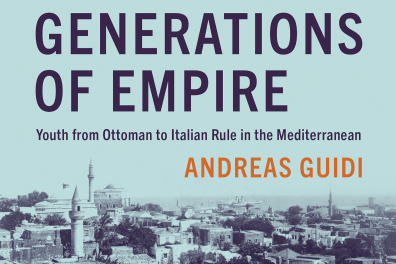Prize for the best first book in Mediterranean studies awarded to Andreas Guidi

You'll find here the link for more information on this prize.
Book summary
"Generations of Empire" is remarkable for several reasons. Focusing on the island of Rhodes in the eastern Mediterranean during the first half of the twentieth century, when the multi-ethnic Dodecanese region moved from Ottoman to Italian rule, this book examines a society in transition from pre-modern to modern colonial empire. Focusing on continuities rather than ruptures, Guidi reframes Italian colonialism in the Mediterranean as a post-Ottoman phenomenon and brings together two historiographical fields that tend to work separately: Italian and Ottoman history. By showing how Italy built its empire by engaging with pre-existing empires, Guidi encourages a reading according to which pre-modern, multi-ethnic empires were replaced, not by modern nation-states, but by modern colonial powers. He thus complicates the conventional dichotomy between empire and nation-state. Moreover, his focus on the daily lives of local inhabitants highlights the ways in which people navigated diverse ethnic and religious affiliations, different levels of Italian citizenship, and local and imperial power structures. By recounting the diverse trajectories of Greek Orthodox, Jewish, Catholic and Muslim families and individuals, "Generations of Empire" is also a book about mobility in the modern Mediterranean and the reshaping of belonging between communities and nations at a time of profound geopolitical transformation.
You'll find here the link for more information on the book.
Author biography
Andreas Guidi is a lecturer in history at Inalco, a full member of CREE and an associate member of CETOBaC. His research focuses on imperial and post-imperial societies in Southeast Europe, namely the interactions between Italy and the Ottoman and Hamburg worlds. His current research project questions the territorial transformation of the Mediterranean in the XXe century through the prism of illicit trafficking.
He is a contemporaneist historian with a particular interest in the late XIXe and early XXe centuries. His research focuses on contacts between areas such as Southeastern Europe, the Mediterranean, the Ottoman space and Italy.
In his dissertation, written under the joint supervision of EHESS and Berlin's Humboldt University, he analyzed the political and social transformation of an Ottoman province into a colony of Fascist Italy. Taking the city of Rhodes as a prism, his thesis focused on the impact of this transformation on intergenerational relations and representations of youth. Her study aims to propose a connected history of empires in the Mediterranean in contemporary times, and to consider the fascist empire in its post-Ottoman dimension. The generational approach also offers a framework for investigating the relationships between the state, various community institutions, and local families.
His current project interrogates the history of smuggling in the contemporary Mediterranean. He is focusing on Southeast Europe as a transit area for various forms of trafficking (arms, drugs, people). In this project, he explores how smuggling is defined, practiced and fought. I'm particularly interested in the transformations of space (cultivation, production, trade and consumption of illicit products), the internationalization of law and trafficking surveillance mechanisms, and the transnational trajectories of the men and women involved in trafficking.
.